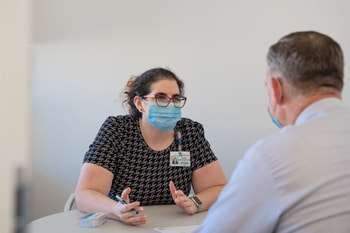Genetic Testing for Cancer
Find your care
Learn about your inherited risks so you can make informed decisions about your health care. For more information, connect with a cancer care specialist at 310-825-5287.
Genetic testing for cancer can find many of the inherited mutations tied to the disease. With your input, our genetic counselors help determine whether you might benefit from genetic testing, and which test is right for you.
How Genetic Testing for Cancer Works

You may already know that a mutation that increases the chance to develop cancer runs in your family, for example. Or you may have family members who developed cancer at a young age, or multiple family members with the same cancer or had similar or related cancers. Or, you may also have a personal cancer diagnosis and a strong family history of cancer.
There are a wide range of genetic cancer risks we can assess. Should you decide to get tested, we simply need a blood or saliva sample. Then:
- We send the sample to a certified outside lab.
- The lab returns results in a few weeks.
- Our team interprets the results and helps you understand their significance.
Considerations for Genetic Testing
While genetic testing for cancer is a powerful tool, not everyone pursues it. Our team explains what you should consider when making the decision, including the risks, benefits and limitations. We help you work through questions like:
- How likely are test results to provide useful, accurate answers?
- Will results potentially affect your medical care?
- How might you react to knowing your test results?
- Will your family members want to know?
- Are you concerned for your children, or any children you want to have?
Possible Benefits of Genetic Testing for Cancer
By deciding to get genetic testing, you can:
- Determine if you carry an inherited mutation in a gene that increases your chance to develop cancer:
- Improves your understanding of your risks for cancer so you and your doctor can make the best decisions for your care.
- Start getting scans and other tests on a regular basis to catch certain cancers early
- Consider preventative surgeries or chemoprevention.
- Find out if your cancer diagnosis is tied to inherited factors; some inherited mutations will help guide treatment decisions with certain drugs or surgeries.
- May allow entry into some clinical trials for screening/and or treatment.
- Protect other family members, especially those who also carry the genetic change but have not been diagnosed with cancer.
- Get more information for family planning.
What Genetic Test Results Mean
After undergoing genetic testing for cancer, you receive one of three possible results:
- Positive: You have inherited a genetic change that increases your chance of developing cancer. Keep in mind, though, that this is not a diagnosis of cancer, and this result just means your risk of developing cancer is higher than someone who does not have an inherited genetic change. Not everyone with one of these genetic changes develops cancer.
- Negative: The lab did not find a genetic change, or changes, included in the test. (Other family members may still carry one, though.) But researchers have not identified all genetic changes tied to cancer — a challenge for families who have many affected family members no known cause. Your genetic counselor will provide you with a risk assessment for cancer even if you have a negative genetic test result. This assessment is based on your personal and family history. Having a strong family history of breast cancer, colon cancer or other cancers may change our recommendations for your screening even if your genetic test is negative.
- Variant of unknown or uncertain significance (VUS): Testing revealed a genetic change, or changes. But researchers do not yet understand the significance of the results because in many genes we do not know the extent of normal human variation. Such changes may not pose a danger, or they could impact the gene and increase the risk for cancer or other disease. A VUS is not used to change or guide medical management, and most VUS represent normal human differences and are not associated with disease.